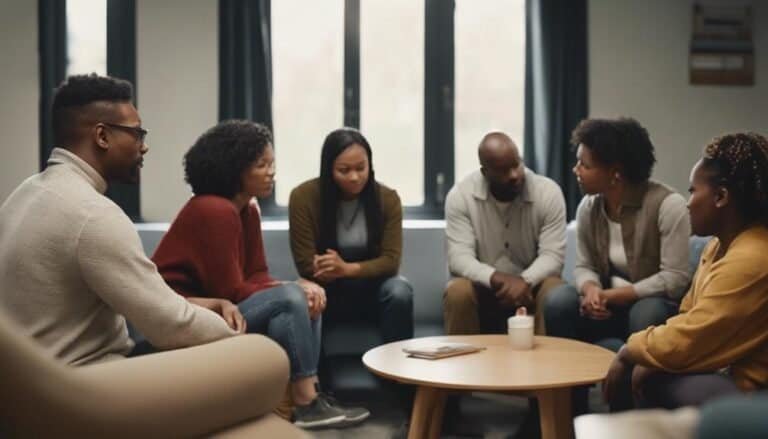School Counseling: Supporting Student Success
Have you ever noticed how school counselors play an essential role in shaping the academic and personal success of students?
From providing academic support strategies to fostering social and emotional guidance, school counselors are instrumental in creating a supportive environment for student growth.
But what specific methods do these professionals employ to empower students to succeed beyond the classroom?
Let's explore the multifaceted approaches school counselors use to support student success and well-being.
Key Takeaways
- School counselors play a crucial role in academic support and student success.
- Social and emotional guidance, along with stress management, are vital for student well-being.
- Individualized student plans and goal setting promote academic and personal growth.
- Collaborative partnerships and effective progress monitoring lead to student achievement.
Role of School Counselors
When supporting student success, school counselors play a pivotal role in providing guidance, encouragement, and resources to help students navigate academic and personal challenges. Counseling techniques are essential tools that counselors use to assist students in addressing various issues they may face. By employing active listening, empathy, and problem-solving skills, counselors can help students explore their feelings, thoughts, and concerns in a safe and supportive environment.
Student advocacy is another important aspect of a school counselor's role. Advocating for students' needs and rights guarantees that they receive the support and accommodations necessary to thrive academically and emotionally. Whether it's collaborating with teachers, parents, or community resources, counselors work tirelessly to ensure students' voices are heard and their best interests are represented.
In times of crisis, counselors provide essential support through crisis intervention and mental health assistance. They're trained to identify signs of distress, offer immediate support, and connect students with appropriate resources for ongoing help. By being a constant source of guidance and care, school counselors profoundly impact students' well-being and academic success.
Academic Support Strategies
To support your academic success, implementing effective academic support strategies is essential. Developing strong study habits and improving your time management skills are key components in achieving your academic goals.
Here are some strategies to help you excel in your academic journey:
- Establish a Routine: Setting a consistent study schedule can enhance your productivity and help you stay organized.
- Utilize Effective Study Techniques: Experiment with different study methods to find what works best for you, such as active learning, creating study guides, or teaching the material to someone else.
- Prioritize Tasks: Use tools like planners or digital apps to prioritize assignments based on deadlines and importance, ensuring you allocate enough time for each task.
Social and Emotional Guidance
Hey there!
When it comes to social and emotional guidance, it's all about understanding and empathy.
As a school counselor, you play an important role in helping students build resilience skills and navigate peer relationships.
Empathy and Understanding
Understanding and practicing empathy is essential in providing effective social and emotional guidance to students. Empathy training helps you connect with students on a deeper level, fostering trust and openness. By understanding emotions, you can better support students in managing their feelings and guiding challenges.
When students feel understood and valued, they're more likely to engage in counseling sessions and seek help when needed. Remember, listening attentively, acknowledging their emotions, and showing compassion are key elements of demonstrating empathy. Your role as a school counselor isn't just to offer advice but to create a safe space where students feel heard and supported.
Through empathy and understanding, you can make a meaningful difference in students' lives.
Building Resilience Skills
As you guide students through challenges and support their emotional well-being, helping them build resilience skills is a key aspect of your role in providing social and emotional guidance. Resilience building is about equipping students with the tools to navigate difficulties and bounce back stronger. Encouraging self-care strategies is essential in this process. By promoting activities that nurture their mental and emotional health, you empower students to cope with stress and setbacks effectively. Here is a simple table to illustrate some self-care strategies you can introduce to students:
| Self-Care Strategies | Description |
|---|---|
| Mindfulness Practices | Techniques to focus on the present moment and reduce stress. |
| Physical Activities | Engaging in exercises to boost mood and overall well-being. |
| Creative Outlets | Encouraging expression through art, music, or writing. |
Peer Relationship Dynamics
Encouraging healthy peer interactions is crucial in fostering a supportive social environment for students' emotional growth and well-being. When it comes to Peer Relationship Dynamics, as a school counselor, you play an essential role in shaping these interactions positively.
Here's how you can help:
- Peer conflict resolution: Teach students effective communication and problem-solving skills to navigate conflicts peacefully.
- Social skills development: Offer guidance on active listening, empathy, and assertiveness to enhance students' social competence.
- Bullying prevention: Educate students on recognizing, reporting, and standing up against bullying behavior to create a safe school environment.
Individualized Student Plans
To facilitate the academic and personal growth of each student, creating tailored Individualized Student Plans is essential in ensuring their success. These plans are personalized interventions designed to meet the unique needs of students, supporting their academic growth and overall well-being.
By implementing tailored approaches, school counselors can address specific challenges students may face, such as academic struggles, social-emotional concerns, or career planning.
Individualized Student Plans involve collaboration between the student, parents or guardians, teachers, and the school counselor. Through these plans, academic goals are set, strategies are developed to overcome obstacles, and resources are identified to support the student's journey towards success.
These plans serve as roadmaps that guide students in achieving their full potential by providing them with the necessary tools and support systems.
Collaborative Partnerships
Establishing strong collaborative partnerships with key stakeholders is vital in enhancing student support and success throughout their educational journey. By working together with parents, educators, and mental health professionals, school counselors can create a supportive network that nurtures students' holistic well-being.
Collaborative partnerships benefit students in various ways:
- Parent Involvement: Engaging parents in the counseling process fosters a united front in supporting students. It allows for a more thorough understanding of the student's needs and facilitates consistent support both at home and at school.
- Mental Health Awareness: Partnering with mental health professionals raises awareness about the importance of mental health support in a student's overall development. It helps in identifying early signs of mental health concerns and provides timely interventions.
- Educator Collaboration: Working closely with teachers guarantees a cohesive approach to student success. Sharing insights and strategies can create a more supportive and inclusive learning environment for students.
Through these collaborative efforts, students receive thorough support that addresses their academic, emotional, and social needs, fostering a positive educational experience.
Coping Skills Development
Developing effective coping skills is essential for students to navigate challenges and thrive in their academic and personal lives. In the fast-paced school environment, stress management techniques and self-care practices play a critical role in maintaining emotional well-being. Encouraging students to engage in mindfulness exercises can help them stay present, reduce anxiety, and improve focus. Teaching emotional regulation strategies equips students with the tools to handle their feelings constructively, fostering resilience in the face of adversity.
When feeling overwhelmed, remind yourself to take deep breaths and ground yourself in the present moment. By practicing self-compassion and acknowledging your emotions without judgment, you can better cope with stressors. Find activities that bring you joy and relaxation, whether it's listening to music, going for a walk, or spending time with loved ones. Remember, prioritizing your mental health isn't selfish; it's necessary for your overall well-being. As you develop coping skills, you empower yourself to face challenges with confidence and resilience.
Goal Setting and Achievement
When setting goals, remember to make them specific, measurable, achievable, relevant, and time-bound – in short, SMART goals.
It's important to monitor your progress regularly to stay on track and adjust your strategies as needed.
SMART Goal Setting
To set yourself up for success in reaching your academic goals, it's essential to create SMART goals that are specific, measurable, achievable, relevant, and time-bound.
When setting SMART goals, consider the following:
- Specific: Clearly define what you want to accomplish.
- Measurable: Establish criteria to track your progress.
- Achievable: Set goals that challenge you but are within reach.
Monitoring Progress Effectively
Effective monitoring of your progress towards your goals is crucial for achieving success and staying on track. By consistently tracking data and monitoring your goals, you can identify what's working well and where adjustments may be needed.
Set specific checkpoints to review your progress regularly, allowing you to celebrate achievements and make necessary modifications to your action plan. Utilize tools like progress charts or goal-tracking apps to visualize your advancements.
Remember that goal monitoring isn't just about reaching the endpoint but also about the journey towards it. Stay motivated by reflecting on how far you have come and remain flexible in adapting your strategies to ensure continuous progress towards your desired outcomes.
Community Resources Utilization
Community resources offer valuable support and assistance to students in their academic journey. Leveraging these resources effectively can greatly enhance the overall student experience. Here are a few ways community resources can be utilized to benefit students:
- Access to Specialized Programs: Community resources often provide access to specialized academic programs that cater to different learning styles and needs. These programs can offer additional support and enrichment opportunities for students.
- Mental Health Services: Many community resources offer mental health services that can provide counseling and support for students facing emotional or psychological challenges. This can be vital in promoting overall well-being and academic success.
- Internship and Job Opportunities: Through community engagement, students can access internship and job opportunities that align with their career interests. These experiences not only provide valuable real-world skills but also help in building professional networks for the future.
Creating Supportive Environments
Creating supportive environments for students involves fostering a sense of belonging and empowerment that enhances their overall well-being and academic growth. Positive reinforcement and inclusive practices are key elements in creating such environments. By acknowledging and celebrating students' achievements, you can boost their self-esteem and motivation. Incorporating inclusive practices guarantees that all students feel valued and respected, regardless of their background or abilities.
To further nurture a supportive environment, it is essential to establish safe spaces where students feel comfortable expressing themselves without fear of judgment. Cultural sensitivity plays an important role in creating an inclusive atmosphere where students from diverse backgrounds feel understood and accepted. By promoting cultural awareness and respect, you can cultivate a sense of unity among students and foster a harmonious learning environment.
| Supportive Environments | Benefits | Strategies |
|---|---|---|
| Positive reinforcement | Boosts self-esteem | Acknowledge achievements |
| Inclusive practices | Valued and respected | Embrace diversity |
| Safe spaces | Encourages self-expression | Establish trust |
| Cultural sensitivity | Fosters unity | Promote cultural awareness |
| Empowerment | Enhances academic growth | Encourage student involvement |
Empowering Students to Succeed
Encouraging students to take ownership of their learning journey is a fundamental aspect of fostering their success. By empowering students to succeed, school counselors play an important role in helping individuals realize their full potential.
Here are some key strategies to support students in their quest for achievement:
- Promoting Student Engagement: Actively involving students in their learning process can increase their motivation and overall performance. Encourage participation in class discussions, group projects, and extracurricular activities to enhance engagement.
- Implementing Motivational Strategies: Utilize various motivational techniques to inspire students to set goals and aim for excellence. Providing positive reinforcement, setting achievable targets, and recognizing their accomplishments can boost their confidence and drive.
- Fostering a Growth Mindset: Encourage a growth mindset by emphasizing the importance of perseverance, resilience, and the belief that abilities can be developed through dedication and hard work. This approach can help students overcome challenges and view failures as opportunities for growth.
Empowering students through these strategies can lead to increased confidence, self-efficacy, and ultimately, academic success.
Frequently Asked Questions
How Can School Counselors Address the Specific Needs of Students From Marginalized Communities?
You can support students from marginalized communities by prioritizing equity advocacy and implementing culturally responsive strategies. Empower them through understanding, validation, and tailored support. Your role as a counselor is vital in fostering their success and well-being.
What Training and Qualifications Are Required for School Counselors to Effectively Support Student Success?
Imagine a journey where you constantly evolve. For school counselors to excel in supporting student success, a blend of professional development and ongoing training is vital. Acquiring academic support and career guidance skills is essential.
How Do School Counselors Navigate Confidentiality and Privacy Concerns When Working With Students?
When you're a school counselor, managing confidentiality challenges and privacy considerations with students is crucial. You must establish trust, communicate boundaries clearly, and adhere to ethical guidelines to guarantee a safe and supportive environment for all.
What Are Some Innovative Approaches That School Counselors Are Using to Reach Students in Today's Digital Age?
To connect with students in today's digital age, school counselors are leveraging virtual workshops and online resources. By engaging in digital outreach and utilizing social media, counselors can reach students where they are most active and provide valuable support.
How Do School Counselors Address the Mental Health Needs of Students in Crisis Situations?
When students face mental health crises, school counselors provide crisis intervention using trauma-informed approaches. They offer immediate support, assess the situation, and connect students with resources. Your well-being is their priority, ensuring you feel safe and supported.
Conclusion
As you journey through the ups and downs of school life, remember: 'It takes a village to raise a child.'
Your school counselor is an essential part of that village, offering support, guidance, and resources to help you succeed.
With their help, you can conquer challenges, set goals, and reach new heights.
So embrace their support, believe in yourself, and let your potential shine bright.
You've got this!







